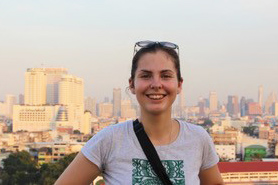Following Political Science Course, Trinity Student Publishes Research on Authoritarianism and Military Support
Trinity College student Darya (Dasha) Maliauskaya ’22 recently published a paper in the Inquiries Journal about authoritarian leaders and military support. This open-access academic journal allows students at the undergraduate and graduate levels to publish their work in the humanities, arts, and social sciences.
The research Maliauskaya has done explores how autocrats use power, coercion, and loyalty to influence the military into supporting the regime during mass uprisings. “The paper aims to show the ways through which authoritarian leaders can either increase or decrease their cohesiveness with the military, as an institution, which then affect whether the military supports an autocrat during mass uprisings,” she said. “I’m generally interested in understanding the theoretical dimensions of authoritarian regimes and exploring the interconnected phenomenon of authoritarianism and social movements.” Read Maliauskaya’s paper here.

Maliauskaya is from Belarus and is a double major in political science and international studies, with a focus on Middle Eastern studies. In the fall of 2021, she took the political science course, “Authoritarianism,” with Associate Professor of Political Science Reo Matsuzaki. The course focused on examining authoritarian regimes in Eastern Europe, the Middle East, and East and Southeast Asia.
For their midterm papers, the students were given the freedom to conduct their own research on an authoritarian regime of their choosing and relate it to what they had learned and studied in the first half of the semester. Maliauskaya analyzed a case study focusing on the Arab Spring in the Middle East and the countries affected. “Born and raised in Belarus, in a country that was not a democracy, I was compelled to study how authoritarian regimes function and what the sources of their resilience were,” said Maliauskaya. “The subject of my paper is not only relevant in the context of the Arab Spring, but also applicable to other instances of nonviolent mass protest across the globe, where the military determined the outcomes of the mass protest in favor of authoritarianism.”
Matsuzaki, who encouraged Maliauskaya to publish the paper she wrote for her midterm, said, “This essay, and my interactions with her in class and in my office, demonstrated to me early on that engaging complex theories, doing research, and writing came naturally to Dasha. She clearly had the mindset of a scholar and researcher.”
Maliauskaya said her political science and religious studies courses relating to Middle Eastern studies influenced and contributed to her research. Specifically, the “War and Peace in the Middle East” course and the “Modern Islamist Movements—Religion, Ideology, and the Rise of Fundamentalism” course aided her knowledge on the Arab Spring in 2011 and the complexities of socio-political movements in the Middle East and North Africa.
While conducting her research, Maliauskaya focused on reading primary and secondary sources, as well as scholarly studies to write her article. She read academic research that included information on the role of the military in authoritarian regimes; specifically focusing on the work of other researchers that examined cases where the military either remained loyal to authoritarian rulers or defected to opposition amid mass uprisings. Her research includes the case studies of the Arab Spring countries, as well as the general theory of authoritarianism and military support.
Maliauskaya wrote her senior thesis on women’s participation in contentious politics in Belarus and Ukraine. After graduating from Trinity, Maliauskaya is deciding between continuing her studies to get a master’s degree or going into an occupation related to political science, such as a research or program assistant.
The Inquiries Journal is open to all undergraduate and graduate students who want to publish their work, giving students access to publishing and taking their work out of the classroom and offering it to others.
To learn more about political science at Trinity, click here.
